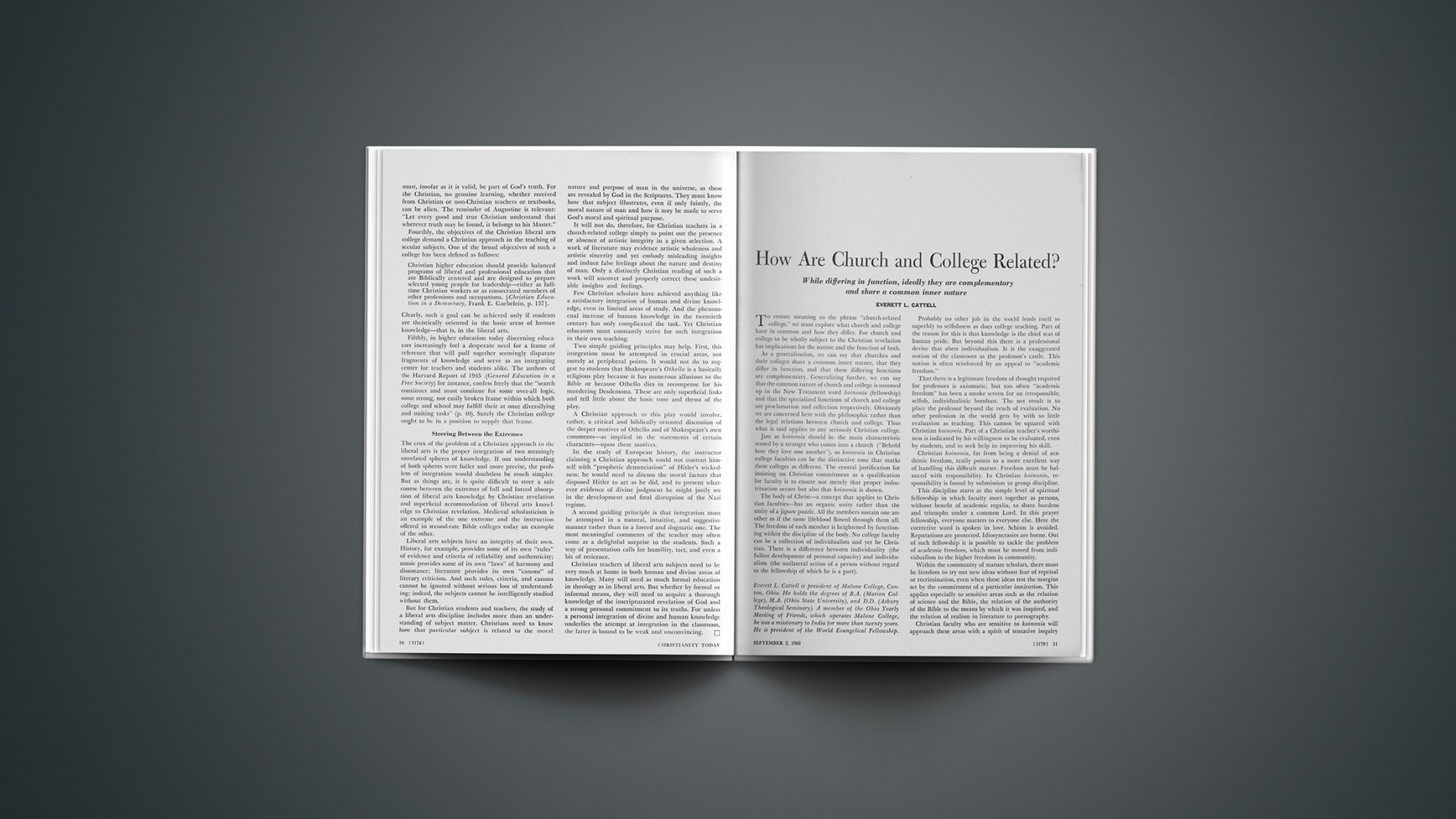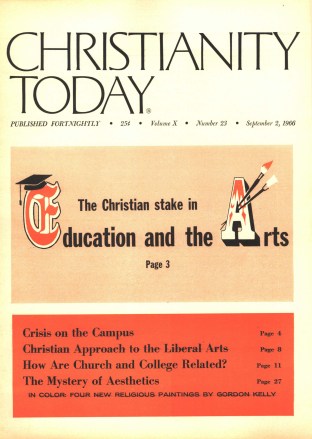While differing in function, ideally they are complementary and share a common inner nature
To restore meaning to the phrase “church-related college,” we must explore what church and college have in common and how they differ. For church and college to be wholly subject to the Christian revelation has implications for the nature and the function of both.
As a generalization, we can say that churches and their colleges share a common inner nature, that they differ in function, and that these differing functions are complementary. Generalizing further, we can say that the common nature of church and college is summed up in the New Testament word koinonia (fellowship) and that the specialized functions of church and college are proclamation and reflection respectively. Obviously we are concerned here with the philosophic rather than the legal relations between church and college. Thus what is said applies to any seriously Christian college.
Just as koinonia should be the main characteristic sensed by a stranger who comes into a church (“Behold how they love one another”), so koinonia in Christian college faculties can be the distinctive tone that marks these colleges as different. The central justification for insisting on Christian commitment as a qualification for faculty is to ensure not merely that proper indoctrination occurs but also that koinonia is shown.
The body of Christ—a concept that applies to Christian faculties—has an organic unity rather than the unity of a jigsaw puzzle. All the members sustain one another as if the same lifeblood flowed through them all. The freedom of each member is heightened by functioning within the discipline of the body. No college faculty can be a collection of individualists and yet be Christian. There is a difference between individuality (the fullest development of personal capacity) and individualism (the unilateral action of a person without regard to the fellowship of which he is a part).
Probably no other job in the world lends itself so superbly to selfishness as does college teaching. Part of the reason for this is that knowledge is the chief seat of human pride. But beyond this there is a professional device that abets individualism. It is the exaggerated notion of the classroom as the professor’s castle. This notion is often reinforced by an appeal to “academic freedom.”
That there is a legitimate freedom of thought required for professors is axiomatic; but too often “academic freedom” has been a smoke screen for an irresponsible, selfish, individualistic bombast. The net result is to place the professor beyond the reach of evaluation. No other profession in the world gets by with so little evaluation as teaching. This cannot be squared with Christian koinonia. Part of a Christian teacher’s worthiness is indicated by his willingness to be evaluated, even by students, and to seek help in improving his skill.
Christian koinonia, far from being a denial of academic freedom, really points to a more excellent way of handling this difficult matter. Freedom must be balanced with responsibility. In Christian koinonia, responsibility is found by submission to group discipline.
This discipline starts at the simple level of spiritual fellowship in which faculty meet together as persons, without benefit of academic regalia, to share burdens and triumphs under a common Lord. In this prayer fellowship, everyone matters to everyone else. Here the corrective word is spoken in love. Schism is avoided. Reputations are protected. Idiosyncrasies are borne. Out of such fellowship it is possible to tackle the problem of academic freedom, which must be moved from individualism to the higher freedom in community.
Within the community of mature scholars, there must be freedom to try out new ideas without fear of reprisal or recrimination, even when these ideas test the margins set by the commitment of a particular institution. This applies especially to sensitive areas such as the relation of science and the Bible, the relation of the authority of the Bible to the means by which it was inspired, and the relation of realism in literature to pornography.
Christian faculty who are sensitive to koinonia will approach these areas with a spirit of tentative inquiry rather than dogmatism. Some of these new ideas will survive and become advanced insights good for everybody. Others will, in the give-and-take of faculty discussion over a period of time, emerge as untrue. This freedom among scholars, however, is quite different from the flaunting of untried notions before students.
So the college faculty shares with the church the experience of Christian fellowship or koinonia. But how do college and church differ in function?
At the very center of the Christian view is God’s relation to man, and the proclamation of God’s good news of reconciliation is the main task of the church. Indeed, this doctrine of reconciliation is so crucial in the New Testament that its rediscovery by those who have reacted against liberalism has been so enthusiastic as to lead some to the extreme (and the error) of universalism.
In rejecting universalism, however, we must not minimize the enormous scope of redemption in the New Testament. The main burden of the Bible is its concern for the reconciliation of man to God through atonement and repentance. Yet in addition there are many hints of the cosmic significance of God’s reconciling acts. It is the purpose of the church to proclaim to all men God’s reconciling message, but it is the purpose of the Christian college to reflect upon the implications of the Lordship of Christ in every area of thought.
The primary purpose for having a committed Christian faculty in a Christian college is not to proclaim to students what might be called salvation facts. As a practicing Christian person, the faculty member will, to be sure, be a witness. But he will be this because he is a Christian person and not because he is a professor. In identifying with the whole range of truth, the college cannot dissociate itself from proclamation. Therefore a college that is seriously Christian will make its chapel services and its weeks of religious emphasis a very carefully planned and meaningful confrontation of the academic community with the total claims of Christ upon life as well as mind. For this no apology is needed.
But justification for the Christian college does not lie in its repeating the work of the church. Obviously, it costs a lot less to preach the Gospel through the church than by building colleges! Nor is the answer merely that the Church is concerned with kérygma (proclamation) and the college with didaché (teaching), for the didaché of the New Testament is really an extension of the kérygma. A Bible college might be justified on the basis of didaché but not a liberal arts college.
What then is the function of the Christian liberal arts college? At the risk of oversimplification, we might say that it is concerned with what the Apostle Paul called “the wisdom of this world” and its relation to the Christian revelation. Paul warned against being enamored of the world’s wisdom when it was not related to and grounded in the message of the Cross.
The earliest Church Fathers misunderstood this warning. Refusing to have anything to do with “pagan” learning or education, they gave themselves exclusively to proclaiming the kérygma and expounding the didaché. This attitude was reinforced by the fact that the Apostle Paul mentioned philosophy only rarely, and then only to belittle or condemn.
Later Church Fathers, struggling with the problem of communicating the Gospel to pagans, began to realize that pagan learning contained vast amounts of truth; that the Apostle Paul, while deriding certain pagan philosophies, was actually very philosophical indeed in his treatment of the cosmic aspects of God’s reconciling work; and that the apostle was decrying, not learning nor even philosophy as such, but a certain twist or bias in the treatment of them. To rush to the heart of the matter: Paul was decrying the humanism of the Greeks, not because most of what they set forth was false, but because the framework of their thinking made men the measure of all things. Over against this, he insisted that all knowledge must be set against a new framework taken from Christian revelation, where the Incarnation becomes the measure of all things.
This means that:
Having tried to master the philosophies and religions of the world as should be done in a secular institution, the Christian liberal arts college goes beyond and sees these against the framework of the Christian revelation;
Having tried to master the techniques and findings of the behavioral sciences and to learn about the average man, the Christian college goes beyond and compares these findings with the perfect man, Jesus Christ, understanding that man’s self-knowledge is not complete unless he goes beyond describing what man does to realizing what man ought to do;
Having tried to master the disciplines of the scientific method and the factual discoveries of the natural sciences, the Christian college goes beyond to see these in the framework of God’s creation (it is assumed that God’s revelation in nature does not contradict his revelation in history or in the Bible, and that whenever a contradiction seems apparent, we have improperly interpreted either science or the Bible or both and must suspend judgment and pursue the matter further until the apparent contradiction is resolved);
Having sharpened skills in communication through the study of the world’s masters of expression in literature, speech, drama, art, and music, the Christian college goes beyond the ephemeral judgments of the contemporary mood and views these arts against the timeless Christian values.
In the Christian college, then, the student receives not less but more than he would get at a secular institution.
If we have any valid case for inviting students to attend a Christian college, it is not that the college does what the church does, nor that the college takes a position on certain social matters, nor that it maintains a religious atmosphere. Rather, the case must be that in the classrooms, the various subject matters are integrated into a Christian world view that is presented to students as a live option. This is the implication for the Christian college of sharing with the church a commitment to the Christian revelation. This is the real genius of the Christian college.










